Joe Manchin and Kyrsten Sinema blocking Biden's climate agenda

 Getty Images
Getty ImagesJoe Biden heads to Glasgow in the coming days for a crucial climate summit at which he hopes to cajole international partners into era-defining commitments to reduce carbon emissions. But two senators could undermine his green credentials at the worst possible time.
In a Senate balanced on a knife's edge between Democrats and Republicans, Joe Manchin and Kyrsten Sinema have found their moment.
They may share the moderate lane of the party, the centre ground of US politics, but beyond that the two could hardly be more different.
The rugged 74-year-old man from the mountains of West Virginia and the 45-year-old iconoclastic woman from the deserts of Arizona.
One enjoys extended chats with political reporters and hosts parties for fellow senators on his houseboat. The other barely speaks to the press and flies back to her home state at the slightest opportunity.
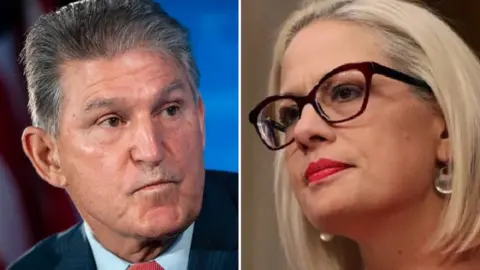 Getty/ Reuters
Getty/ ReutersBut for all their differences, they are united in opposing parts of Joe Biden's ambitious climate programme - with its ultimate goal of reducing US greenhouse gas emissions to half of 2005 levels.
And now it's a race to strike an agreement on a spending bill that allays their concerns without diluting the US president's green agenda before he arrives in Glasgow on Sunday.
So what is driving their thinking?
The man from the mountains
On Sunday morning in Wilmington, Delaware, the president of the United States, the majority leader of the US Senate and the senator from West Virginia sat down for breakfast.
Manchin, hailing from a rural state with only 1.8 million people and a fraction of a percent of the total US gross domestic product, was the one calling the shots.
Because of a legislative procedure, Biden and the Democratic congressional leadership hope to use to pass their upcoming spending package with a simple majority, Manchin's support could be the difference between success and failure.
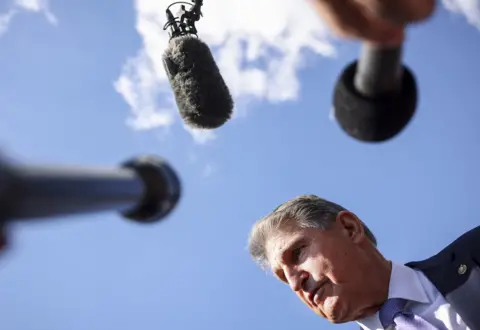 Getty Images
Getty ImagesThe West Virginian had already effectively scuttled what was the centrepiece of Biden's legislative climate agenda, a $150bn programme that would have rewarded energy producers that switched to renewable sources of power and fined those that continued to rely on fossil fuels. Now he is reportedly targeting a fee on the emission of methane, a potent greenhouse gas.
He has said he is more amenable to investments in renewable resources as long as they are accompanied by research to make fossil fuel cleaner and don't endanger existing subsidies for the energy industry.
Part of Manchin's concern with Biden's social-spending and climate agenda is ideological. Manchin is a centrist in a party that is trending more to the left. He's a throwback to a time when his state was controlled by Democrats, but last year Republican Donald Trump won West Virginia by 39 percentage points. Manchin is now the lone Democratic holdout in West Virginia politics and, if he were to choose not to run for re-election in 2024, his seat would almost certainly flip to the Republicans.
Another component of Manchin's view, on climate in particular, is practical.
He is one of the two senators - the other a Republican - from a state whose economy is dominated by the coal industry. In 2019, the most recent year for which there are figures, coal contributed $9.1bn to the West Virginian economy and accounted for about 27,000 jobs. Manchin's energy investments personally provided him with almost half a million dollars in income in 2020. Energy companies gave more to Manchin's political campaigns than any other senator's.
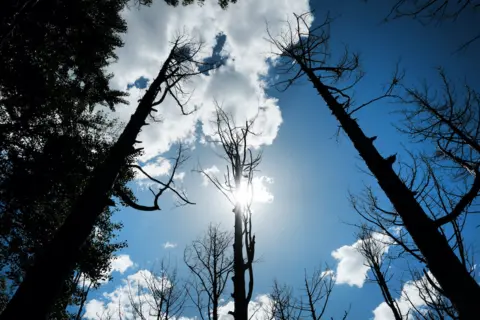 Getty Images
Getty ImagesFrom his perch as chair of the Senate Energy Committee, Manchin has a particular interest in the climate policies his party - and president - seek to enact. And climate policies that present an existential threat to his state's energy business have little hope of escaping his reach.
The woman from the west
If Manchin's motives to scale back Biden's climate agenda are reasonably clear, the reasoning of the other key Senate centrist on the issue is more of a cipher.
Sinema started her career in politics as an activist in the Green Party, before she began a steady climb up through Arizona elective office.
As she's elevated her position, she's moved steadily toward the middle of the political spectrum, culminating in her Senate victory in 2018, the first for a Democrat in the state in 30 years.
 Getty Images
Getty ImagesIn the past year, she's infuriated her party with a vote against raising the minimum wage and by skipping a procedural vote on forming a committee to investigate the January attack on the US Capitol. She's also frustrated liberal activists by keeping her public statements about the spending-bill negotiations to a minimum. Where Manchin will frequently spell out what he will - and won't - support, Sinema treats reporters - and their questions - like a toxic outbreak.
Sinema's relative silence has created a cottage industry of speculation about her motivations and objectives. The left wing of the party point to her frequent meetings with corporate lobbyists as evidence that she's in league with big business interests, perhaps preparing herself for a lucrative post-Senate career.
It's a theory political reporter Joshua Marshall of the website Talking Points Memo doesn't buy.
"You just don't work that hard and that successfully to climb the ladder of political power to flame out after one Senate term to get a job as a lobbyist," he writes. "The money isn't that good."
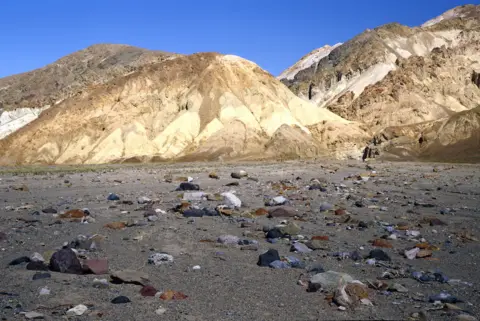 Getty Images
Getty ImagesMarshall speculates that Sinema is styling herself after the late Arizona Senator John McCain, who frequently quarrelled with his fellow Republicans and, shortly before his death, cast a deciding vote against his party to block the repeal of Democratic health-insurance reforms in 2017.
McCain's maverick persona - along with his war-hero record - helped him become an institution in Arizona and ultimately win the Republican presidential nomination in 2008.
Sinema's calculation may be that the key to success in her state, and perhaps nationally, is to burnish her independent credentials. In a state where registered independents outnumber Democrats, it could be a winning strategy.
And so she has expressed opposition to some of the bigger-ticket green-energy subsidies, community funding and spending items in Biden's climate package, while still voicing interest in a tax on carbon used in energy-production (an idea that probably won't fly with Manchin, however).
A Democratic war
There's already talk in liberal circles of mounting a challenge to Sinema in the 2024 Arizona Democratic primary, and left-wing activists have taken to chasing her through airports and in other public spaces to pressure her to be more of a party team player. Manchin has faced similar scrutiny - and liberal outcry.
It is, perhaps, a reflection of just how effective efforts by these two centrists have been that Democrats on the left have become increasingly frustrated with the diminished size of the final bill - and a left-wing rebellion against the final agreement is still a possibility.
It may be too late, however.
While the party's liberal flank has succeeded in delaying passage of an accompanying bipartisan infrastructure bill that both Sinema and Manchin have championed, the size of the president's social spending package has been reduced by trillions of dollars - and the scope of the climate measures have been significantly curtailed - because of the two centrists' efforts.
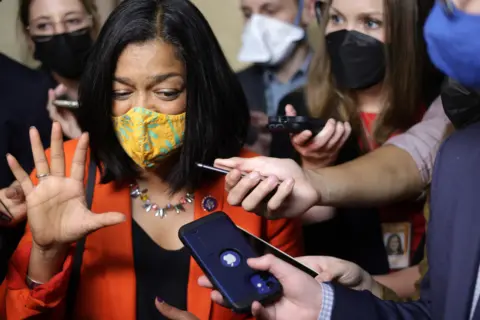 Getty Images
Getty ImagesAccording to reporting by Axios, the White House has scrambled to find a number of new ways to cut emissions, having lost the battle with Manchin over the cleaner energy grid.
As Biden prepares to head to Scotland for next week's climate summit, it will be Manchin and Sinema who are defining the limits of what he can promise the US will deliver - and, perhaps, whether he can make any promises at all.
